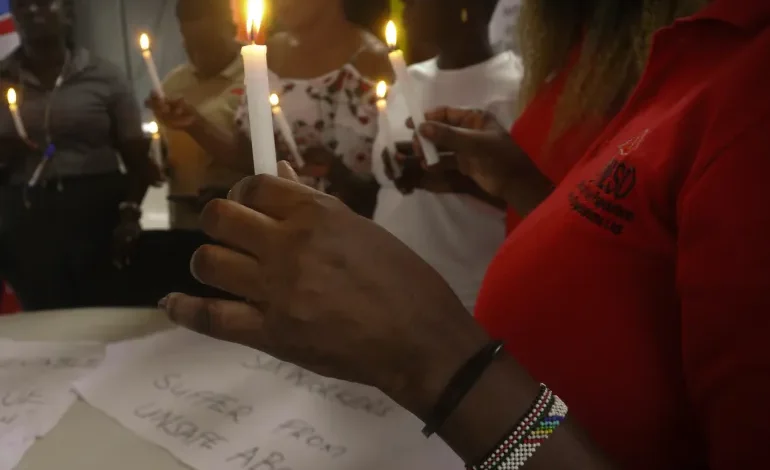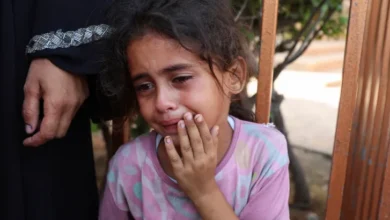‘It’s needless death’: Ugandan activists decry restrictive abortion laws

At exactly 3:21pm on August 25, Moses Odongo received a call informing him that his 14-year-old cousin Christine had died attempting to terminate an unwanted pregnancy.
Odongo, who is 40, had just returned home and was sitting down for a drink and a bite to eat.
His grief at her untimely death quickly mixed with anger at Uganda’s restrictive abortion laws and conservative culture, which he believes killed her.
“This is a problem we are all responsible for,” he said. “We have let down this girl. We have not provided [young] people with sex education … We do not allow anyone to even mention the word abortion.”
Odongo is the founder and executive director of Family Medical Point, a nonprofit that carries out informational programmes and operates small health centres in Entebbe, a city neighbouring the Ugandan capital, Kampala.
Unclear laws
Abortion is highly restricted in Uganda. Both the women who seek it out and the doctors who provide it can face criminal prosecution.
Uganda’s constitution says that abortion is illegal unless provided for under the law, but there is no definitive legislation on abortion in the country.
A colonial-era penal code punishes women terminating a pregnancy with seven years in prison and doctors performing the procedure with 14, unless the mother’s life is at risk.
However, guidelines from the Ministry of Health contradict the penal code by also allowing abortion in cases of foetal anomalies and of rape. A more comprehensive set of instructions on when an abortion can be performed was issued and then withdrawn by the Ministry of Health in 2017.
Ambiguity and fear of imprisonment mean doctors turn away women looking for care, experts told Al Jazeera. The women, influenced by misinformation, then resort to extreme and dangerous measures to rid themselves of unplanned pregnancies.
“The confusion leads to no access whatsoever to the service, because anyone who does it assumes that they’re doing it illegally and could be sent to prison,” explained Primah Kwagala, a lawyer and director of a Kampala-based legal nonprofit, the Women’s Probono Initiative.
She sits behind a computer bedecked with bumper stickers celebrating the right to choose, a copy of Uganda’s constitution open in front of her. Kwagala is part of a team of lawyers fighting to challenge Uganda’s laws and broaden access to health services.
Meanwhile, the same government that restricts abortions provides for post-abortion care in hospitals across the country, spending $14m on it each year. While it is unclear how this contradiction came to be, some doctors say it may be part of efforts to tackle the high number of deaths from unsafe procedures.
Medical physician Oscar Muhoozi told Al Jazeera the government provides post-abortion care to keep in line with international health standards, while at the same time responding to the toll of unsafe abortion in Uganda.
One result of this contradiction, though, has been women putting their lives at risk, experts said – as many who seek an abortion take the unsafe, illegal route, while gambling their lives on the slim hope that they can be saved afterwards.
Even then, these patients face demonisation. “Women seeking post-abortion care are highly stigmatised. That’s a fact,” Muhoozi said bluntly.
Meanwhile, the doctors who provide post-abortion care are also ostracised in Ugandan society.
“My fellow doctors shun me, saying this is a killer,” said Muhoozi, who is the founder of Dynamic Doctors Uganda, a community-based organisation that advocates for reproductive rights. “I find it is so terrible and so demeaning. I really lose confidence.”
Ugandan campaigners are marking International Safe Abortion Day on September 28, but they must operate carefully and covertly in a challenging cultural context, activists say.
“The reason why we work in a coalition is mainly to reduce the stigma that comes with this advocacy,” said Edith Sifuna. She is co-coordinator of the Coalition to Stop Maternal Mortality due to Unsafe Abortion (CSMMUA) and a programme officer at a health justice nonprofit, The Center for Health Human Rights and Development.
“Collective voicing shows that there’s a lot of public interest and public demand for this service,” she added.
Dangerous consequences
International Safe Abortion Day is a fairly recent phenomenon, established by the NGO, Women’s Global Network for Reproductive Rights, in 2011 to mark the liberalisation of abortion laws in South and Central America.
The day has particular resonance in Uganda.
In 2008, the Ministry of Health reported that 8 percent of maternal deaths were the result of unsafe abortion. But this data is unreliable, with the true number of abortion-related deaths likely higher, a 2018 study in the International Journal of Gynaecology and Obstetrics found.










